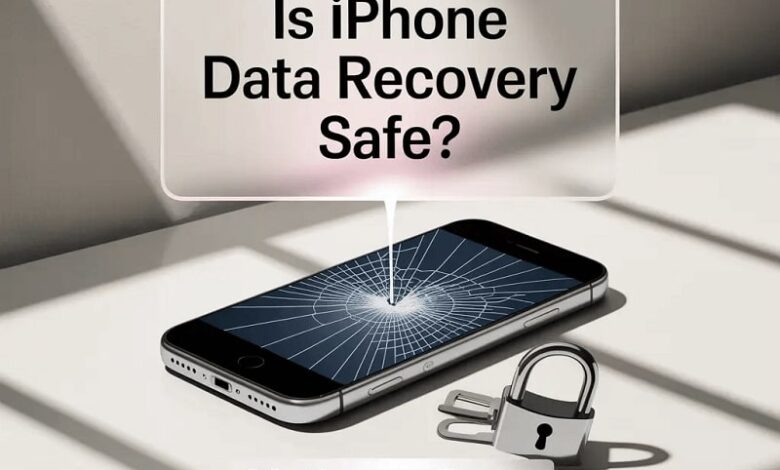Is iPhone Data Recovery Safe? Myths vs. Facts

We live in such an age where our iPhones are not just containing the photos and messages we send and receive but they hold our memories, financial data, credit card numbers, passwords, personal moments of us with family and romantic relationships, these are all things I’m sure you can argue no one wants anyone to have in their possession who isn’t you.” And when the data is lost, the desire to recover it is also urgent. But a lot of users are wary, scared that their privacy will be violated. Is it safe to recover iPhone data? Or is that simply another well-marketed promise? This post separates fact from hype, debunking popular myths and explaining the facts you should first know before trusting in any recovery process or tool.
The Evolution of iPhone Data Recovery
iPhone data recovery has come a long way over the years. When they first started, what you could get back was generally limited to whatever they were able to extract from an iTunes backup. But as the pace of technology picked up, recovery tools got stronger, easier to use. In fact, in many cases transfer iMessages from old iPhone to new iPhone, you don’t even need a backup to undo unwanted deletions of photos, messages, or app data today. Despite these breakthroughs, these approaches are still faced with fear and misconceptions.
There are still some users who will never believe that their data is protected if it’s accessed with any software other than a Windows or Mac application they paid for. But the fact is, the best professional-level iPhone data recovery software does make safety its key concern, encrypting the data during manipulation. The growth of such a field now goes beyond licensed personnel in the approved service centers, and some local electronic repair shop technicians, who among them employ modern utilities and methods to guarantee not only data security but also fast retrieval.
Common Myths About iPhone Data Recovery
A few misconceptions have caused iPhone users to stress about data recovery. This is one of the most common myths, and that is restoring your deleted files breaks your privacy for good. Another common myth is that all recovery solutions will forfeit your device warranty, or even worse, expose it to future data breaches. Some folks even believe that data, once erased, is gone for good unless you’re some kind of tech maestro.
Many times, these myths are born out of old experiences or the rants of the misinformed on blogs. These days, to be honest, most of those recovery tools are made to function nicely within Apple’s newfangled security ecosystem. They also don’t need jailbreaking your phone or any modification to the core functions of your phone. Professional technicians, especially those you can find in a reputable iPhone repair outlet in Pomona, utilize licensed software that meets Apple’s standards. These can-kicked stories have been around for far too long; debunking this can help users to confidently retrieve their data.
What Happens During iPhone Data Recovery?
Knowing how iPhone data recovery services works can help remove much of the fear. When you lose data, it doesn’t vanish instantly from your device. But instead, it fades and is internally identified for overwriting. Recovery utilities scour the phone’s memory bank to find and resurrect these hidden data chunks.
During this software reassembly, no information is “stolen” from the images/video/speech, and no backdoor has been inserted by the software. This is nothing more than an attempt to read whatever data happens to be in the memory, since that part of the memory wasn’t yet overwritten with new data. This means that the sooner you act, the better your prospects for successful recovery. The process, whether through iTunes, iCloud, or another program, is generally non-invasive. Tools typically work in a read-only state, where they don’t modify the actual content, but instead pull out what can be recovered.
When you take your malfunctioning device to a professional recovery facility, such as a hard drive data recovery specialist who also works with mobile devices, those kinds of confidentiality stresses are virtually nonexistent. Your data doesn’t get copied or stored on some other server unless you allow it. An open process and data handling is now the norm on any good recovery platform.
Are Third-Party Recovery Tools Safe?
This is a very common question, and of course it would be! There are so many data recovery programs to choose from, but not all of them are safe. The good news is that many well-reputed developers have, over time, earned the trust of users by maintaining the highest standards in data protection.
Safe third-party apps won’t ask for your device to be jailbroken. Jailbreaking frequently makes your phone more susceptible to malware and security vulnerabilities, and that’s where the real risk comes in. Any tool worth your trust from any company with a decent security pedigree will never ask you to turn off your device’s firewall or antivirus protection.
While selecting software, look out for company histories, user reviews and data handling policies. Most professional repair shops and services vet these tools for you, meaning they only work with the safest options. If you are unsure, the first step is talking to a local electronics repair shop. Their team is usually testing out different recovery options on the ground and can advise you on best performing solutions.
Can Data Recovery Void Your iPhone Warranty?
Will recovering your data void your warranty? That is another common question from users. The short answer is no—unless the hardware is altered or the software is jailbroken.
Apple’s warranty terms explicitly exclude this warranty if the phone is jailbroken or physically modified. But generally, a software-based tool that doesn’t mess with the iOS ecosystem is safe to use. And most recovery tools we have today do play nice with Apple’s guidelines. They carry out logical scans not physical ones, so the internal parts of your phone are never touched.
That said, if you’re at all concerned about warranty considerations, it’s always a smart move to visit an authorized iPhone repair shop in Pomona. Trained technicians know how to get your data without voiding your device warranty or breaking Apple’s terms and conditions.
How to Ensure Safe Data Recovery on Your iPhone
Here are a few things you can do to ensure a data recovery for iPhone will be secure if you’re looking to recover data from your iPhone. Number one, stay away from free apps coming from unknown developers. These are usually unencrypted and could have malware hidden within. Second, never use tools to jailbreak for yourself if you don’t fully understand the risk and the responsibility.
Always remember to back up your device first before any recovery procedures. Recovery tools are generally non-destructive, but it never hurts to have a secondary backup in case something unforeseen goes wrong. Also, be sure to track the permissions any app or software is requesting. A good tool like this will only request the minimum access it needs to access your data.
It might also be worth your time to visit a local electronic repair shop with focus on data recovery and see if they may have some leads too. They frequently employ a class of enterprise-level tools that are safer and more effective than consumer-grade software. Face-to-face visits can also offer peace of mind in that you can ask questions and even observe the process.
The Role of Data Encryption and Security Protocols
Most people don’t know the depth of the encryption recovery tools offer these days. Encryption is increasingly at the heart of secure iPhone recovery. And the top tools working in the encrypted Apple environment keep your data safe while it’s being accessed for recovery.
Communication tools claiming to have end-to-end encryption ensure that data that is retrieved is only readable by the user while being retrieved. This also means that your personal photos, financial information, or chat logs are never kept on a third-party server. Nothing goes onto your device or through insecure channel.
This applies particularly when you’re dealing with a pro technician or service. Ask about their use of encryption and procedures for transporting data, whether they are a hard drive data recovery service or an iPhone specialist. A good provider will be perfectly willing to talk you through their safety protocols.
Recovery Success Rates and What Influences Them
Though iPhone data recovery is generally safe, not every time they are successful. Some of the success depends on how long the data has been deleted, how intensively the device has been used since and the way the data was deleted.
Any data which has been deleted recently, and hasn’t been overwritten, has a far greater chance of recovery. On the other hand, if you’ve still been actively using your phone, new data could be overwriting the old, decreasing your chances of a successful recovery.
High-quality tools and professional services can greatly increase your odds. Local technicians at an iPhone repair shop in Pomona typically have more powerful diagnostic tools than over-the-counter apps that can mine deeper levels of memory. Their knowledge can prove invaluable, particularly in more challenging situations such as physical damage or corrupted memory.
Should You Trust Free Online Recovery Services?
The web is awash with “free” data recovery services, but one must be very cautious. Most of these offer no insight into their practices, and some even upload your private files to unsecured servers for scanning. At worst, they may be scams meant to scrape your data.
When it comes to reputable recovery service, it should always have honest terms, decent security rules and ideally some sort of customer service or live support available. Read the privacy policy every time and find independent reviews. You can always take the device, in case of doubt, to a tech located in your neighbourhood (or a verified electronics repair shop).
Conclusion: Trust, But Verify
Well, is iPhone data recovery safe? And the answer is yes — if done right. The myths about iPhone data recovery are mostly based on old fears or negative experiences during the time of using poor-quality software. When you think about it, there are some very secure, non-intrusive options available in software and professional services that can help you get your data back.
Be it encrypted software, professional technicians, or network operators, whoever you fall back on, it’s essential to ensure that there are no efforts to avoid new expensive glass installations downstream. You want to see transparency, adherence to Apple’s policies, and a proven rate of success. And don’t forget, if you’re feeling unsure, the number of iPhone repair shops in Pomona and electronic repair shops nearby can help steer you towards the best way possible to restore your iPhone data confidently.
Done properly, iPhone data recovery is not just safe, but a smart, proactive decision to safeguard your digital life.





